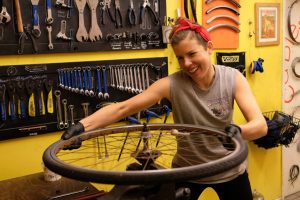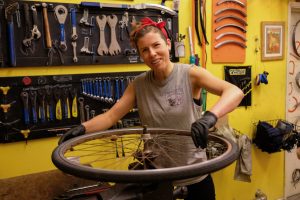The time we’re living through now encourages reflection. What is really important to us? What relationships, activities, and things do we actually need to keep us healthy and happy? What kind of community and society do we want to rebuild out of this…and what can we let go of? For many of us, living under lockdown has stripped away the patterns and routines of our normal lives and left us with space to rethink.
So we’ve been thinking…do community bike projects matter? Do we need them to weather this crisis and come back fighting? If the Broken Spoke is going to face down the bumpy road ahead we’re going to need some motivation – we need to remind ourselves and the world what the point is. To help, we’ve asked some of our dearest pals to tell us what community bike projects like Broken Spoke mean to them. We’ve been hard hit by COVID and we need your support now more than ever. We hope these stories will inspire you to commit to a monthly donation to Broken Spoke to keep us going and allow us to continue our vital work in our community.
Let’s start at the beginning, with one of the founders of Broken Spoke Ellie Smith…
Community bike projects matter so much to me personally – they have set my life on a completely different and wonderful course. And yet, I think they are relatively hidden – tucked away on side streets where rent is cheaper, never making too much of a fuss of themselves. It’s high time we threw some light on what they are and why they matter.
It’s a simple enough concept. Community bike projects are places where anyone can bring along their broken bike and learn how to repair it themselves with help from experienced mechanics. A fantastically useful service for people who get about by bike but the purpose and the impact goes much deeper than that.

Image: Fred Thomas
Community bike projects came into my life when I really needed somewhere I could feel safe to pick up a spanner. Growing up I was not the sort of kid who took stuff apart and put it back together for fun. In fact this would have been (and probably still is) quite an unusual hobby for a little girl, because people assume that playing with tools is an activity for boys. We tend to give boys the kind of toys and encouragement they need to explore how things work mechanically from a young age. We don’t do the same for girls. Luckily I had parents who cycled, and I grew up riding my bike around London.
Cycling, if you are going to travel any distance, necessitates a level of mechanical know-how. The bike doesn’t care what your gender is; if you ride over a thorn you will need to fix your flat tyre. As a young adult, everywhere I turned my ability to learn these skills was blocked either by someone wanting to do it for me or by my own embarrassment at my lack of knowledge. I was a young woman who rode a bike to get me around just about everywhere – to work, on cycle tours and on weekend trips – and I didn’t know the first thing about how it worked. It’s hard enough to learn new things as an adult without all the baggage that comes with people not expecting you to be any good. To this day, I remember the shame I’d feel at the eye rolls I got from mechanics when I asked for the wrong thing in a bike shop, or when I had to walk home with a limping bicycle that, despite my best efforts, I could not fix.
I couldn’t shake free of this embarrassment for years, until I found Oxford Cycle Workshop (the precursor to Broken Spoke) – a community bike project! I took an intro to bike repair class, and, whilst I’m sure I showed no natural promise, I was hooked. I loved developing my understanding of how this machine which I relied on really worked. It was my first experience of the feeling of mastery and satisfaction that comes from being able to make or fix a physical thing.
At last, there was a place I could go to practise mechanics, a place where no one ever told me how hard something was, how challenging and complicated I’d find it. Instead they said – ‘you might find it easier using these tools and this process – can I teach you?’ I absorbed that message and have endeavoured to pass it on in all my mechanical work ever since. We all take our insecurities into the workshop and feel ourselves to be failures if we make a mistake, but mechanics not an innate skill – to learn it you need the opportunity to practise.
Sadly, plenty of people don’t get that opportunity. For many, their gender, sexuality, race, physical ability and many other factors weigh in and create barriers to learning. We picture mechanics a certain way – typically white and male – so we don’t create training opportunities for anyone else. In fact we actively question them when they are plucky enough to want to have a go. If you are always told you are not going to be good at practical mechanical work because, for instance, you’re a woman, a gay man, a person of colour – that’s very likely to affect how you think about your own abilities.
My experience at Oxford Cycle Workshop (OCW) was transformative on a personal level. I retrained as a mechanic and eventually set up Broken Spoke with Will and Cassiope. We’d all been volunteering at OCW when it quite suddenly (or so it seemed to us) went into administration. We were gutted. There was no longer a community workshop in Oxford! We never intended to set up a new one, we just couldn’t bear the thought of there not being one. In those early days when we kept our tools in a garage in Cowley and planned the project from our friends’ kitchen tables, we could only imagine the thriving place Broken Spoke would become.
Eight years on, I now manage the workshop at Greenpeace – a massive prop-building and action planning space with every tool you can imagine. I’m the first woman to have that role and there is no way I would be doing this if it wasn’t for OCW and Broken Spoke. In fact, I struggle to think of a single female bike mechanic I know who has not in some way come up through a community bike project. As Will, says:
‘I’ve seen it with my own eyes, Broken Spoke creates a safe learning space that doesn’t just allow people to defy the expectations they have of themselves or that others have of them, it smashes power structures that put them there in the first place.’

Image: Fred Thomas
We do this through focusing on inclusion: bringing in vulnerable people to use the space; training female mechanics; having the best tools; making sure the workshop is welcoming; celebrating mistakes and thinking carefully about how to teach mechanics to people who may never have engaged with it before. In short, by trying to give anyone and everyone who comes their way a good experience of fixing their bike.This is radical and, as such, these spaces can have a profound positive impact on the people who come to them. Broken Spoke has had a hard blow to the finances from this pandemic but coronavirus didn’t cause the funding problems in community bike projects like this one. All this virus has done is exposed the fragility of these remarkable entities. Community bike projects don’t focus on profit, they focus on the benefits which they can bring to people via the humble bicycle.
To survive the economic realities of this world, community bike projects tend to use two tactics: keeping staff pay pretty low, and finding below market-rate rents. They are resourceful, lean and ingenious. They do SO MUCH with so very little. And their talented staff must be teachers, mechanics, and social entrepreneurs all rolled into one, and somehow muddle through on the living wage. Passion is a wonderful and forceful thing but it cannot sustain you over the long haul. Broken Spoke needs a firmer financial foundation if it is to continue to be a feature of the Oxford community.
Broken Spoke has enabled vulnerable people to gain skills, inspired career changes, taught people to ride bikes, been many peoples’ first experience of mechanics, and helped countless people to get back on their bike and cycle off safely. That’s why I think community bike projects matter. We need to make sure they stick around. If you want to ride alongside and support us, donate monthly and join our amazing community of supporters, volunteers and friends that keep us going.
Ellie Smith, Broken Spoke co-founder

